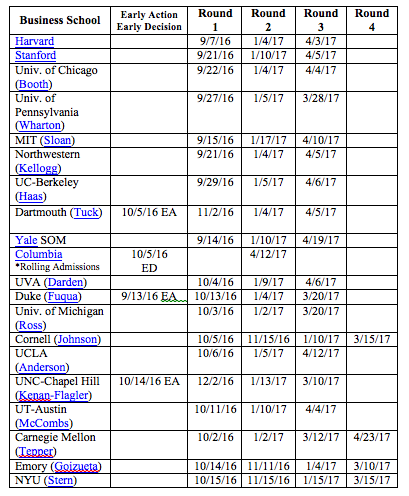If you are applying to business school, you may be weighing the pros and cons of applying during Round 1, Round 2, Round 3, or in some cases, even Round 4. If you apply during an early round, will your application be measured against the most competitive and prepared students? On the other hand, if you apply during a later round, will it be too late and will most spots be filled?
Which Round is Right for me?
Most business schools offer three application deadlines, and a few offer a fourth. The application dates for Round 1 (early September or early October) versus Round 2 (early January) are typically three months apart. Rounds 3 and 4 deadlines tend to occur in late March to early April. Below is a snapshot of the application round deadlines for the top 20 business schools, according to U.S. News & World Report.
2016-2017 Top 20 Business Schools Application Deadlines for Full-Time MBA Programs
In order of US News & World Report Ranking
Early Admissions: Early Action and Early Decision
An Early Action round is only available at some schools, and this round is usually in early September or October. Schools that provide this application option allow students who are reapplying or who are sure they have selected their top choice to demonstrate their interest by submitting an early, non-binding application. Early Action also usually includes consideration for merit scholarships. Columbia Business School offers a binding Early Decision option for students willing to commit to attend if accepted.
Benefits of Applying Round 1 or 2
Applying during Round 1 has many benefits:
- Every spot in the class remains open
- The admissions staff reading your application is just beginning the process and has not yet been inundated by applications
- You will hear your admissions decision earlier and be able to make future plans earlier
- If you are denied from your top-schools in Round 1, you’ll still have time to submit applications to your second-tier schools in Round 2
- Financial aid and scholarships are most plentiful in Round 1
- More on-campus housing options are available
- International applicants need more time to process a visa application
The bottom line, however, is that you should apply during Rounds 1 or 2, at whichever point you can submit your best application. Do not delay and wait a whole year to apply just so that you can apply in Round 1. If you need more time to raise your GMAT score, make campus visits, or enhance your career goals and fill educational gaps, it is perfectly fine to apply during Round 2.
For example, the Wharton MBA Program encourages all first-time applicants to apply in Round 1 or 2 as the majority of the class is selected during these rounds. Harvard also urges applicants to apply during Round 1 or 2. Yale, similarly, encourages students to apply during Rounds 1 and 2, but goes even further, stating that there is no difference at Yale in selectivity between Rounds 1 and 2.
In a few cases, though, the difference between Rounds 1 and 2 is meaningful. Stanford’s admissions website states, “If you plan to apply in round one or two, we strongly encourage you to apply in round one. Over the last few years, the number of applications we receive in round two has increased, making it more competitive.” Stanford also gives the opportunity to attend Admit Weekend for Round 1 and 2, but not Round 3.
Dual Degree Programs
If you are planning to apply for a dual degree, there are some programs, such as Wharton’s MBA/JD, which require you to do so by Round 1 or 2. Other schools, such as Harvard, allow you to apply for the MBA/JD joint degree during any of the three rounds. If you are interested in a dual degree, be sure to check the specific admissions deadlines of your top choices.
Planning and Preparation
When considering application deadlines, you should take into account the length of time that you need to prepare. According to Judith Hodara, the former director of MBA admissions for the Wharton School, prospective MBA applicants should begin to prepare six to nine months before the MBA application deadline. This includes securing letters of recommendation, preparing your resume, writing essays, taking the GMAT, completing any additional coursework, and gathering any other application materials.
Putting together all of the pieces of your MBA application and knowing when to apply can be a daunting process. Collegiate Gateway is skilled in the art of helping students put their best foot forward. Feel free to contact us—we’re always happy to help!

